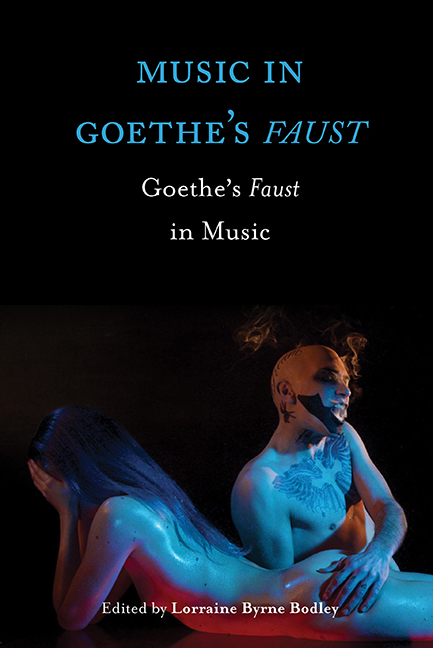Book contents
- Frontmatter
- Dedication
- Contents
- List of Illustrations
- Contributors
- Acknowledgements
- Abbreviations Used in the Notes
- Introduction. Rhapsody and Rebuke: Goethe's Faust in Music
- Part I Goethe's Faust: Content and Context
- 1 The Redress of Goethe's Faust in Music History
- 2 Wagering on Modernity: Goethe's Eighteenth-Century Faust
- 3 Reflectivity, Music and the Modern Condition: Thoughts on Goethe's Faust
- 4 Music and Metaphorical Thinking in Goethe's Faust: The Example of Harmony
- 5 Faust: The Instrumentalisation of an Icon
- Part II Legacies: Goethe's Faust in the Nineteenth Century
- Part III Topographies: Stagings and Critical Reception
- Part IV New Directions: Recent Productions and Appropriations
- Select Bibliography
- Index
1 - The Redress of Goethe's Faust in Music History
from Part I - Goethe's Faust: Content and Context
Published online by Cambridge University Press: 30 August 2017
- Frontmatter
- Dedication
- Contents
- List of Illustrations
- Contributors
- Acknowledgements
- Abbreviations Used in the Notes
- Introduction. Rhapsody and Rebuke: Goethe's Faust in Music
- Part I Goethe's Faust: Content and Context
- 1 The Redress of Goethe's Faust in Music History
- 2 Wagering on Modernity: Goethe's Eighteenth-Century Faust
- 3 Reflectivity, Music and the Modern Condition: Thoughts on Goethe's Faust
- 4 Music and Metaphorical Thinking in Goethe's Faust: The Example of Harmony
- 5 Faust: The Instrumentalisation of an Icon
- Part II Legacies: Goethe's Faust in the Nineteenth Century
- Part III Topographies: Stagings and Critical Reception
- Part IV New Directions: Recent Productions and Appropriations
- Select Bibliography
- Index
Summary
Goethe's influence on music
Anyone who ventures into the vast regions of the nineteenth-century Lied meets a powerful presence almost immediately. Time and again the text is by Goethe, whose lyric imagination left an indomitable imprint on European music history. Even a cursory glance at Friedlaender's Das deutsche Lied bears testimony to multiple settings of Goethe's poems: there are, for example, 132 settings of ‘Erlkönig’, and the range and variety of this abundant repertoire is immediately striking. Ernst Challier's Großer Lieder-Katalog and Willi Schuh's ‘Goethe Vertonungen’ give further evidence of the musicality of Goethe's language and its location of meaning at the cradle of the Lied. Schubert's first masterpiece, Gretchen am Spinnrade, was a setting of a dramatic scene from Goethe's Faust. The earliest songs of Johann Friedrich Reichardt, Louis Spohr, Carl Loewe, Johannes Brahms, Richard Wagner and Hugo Wolf were to texts by Goethe, which raises the question as to the reasons for the poet's influence. Yes, Goethe was a supreme lyric poet. The binding force of form and meaning, or rhythm and sense, that characterizes Goethe's lyric poetry – so evident in ‘Auf dem See’, in the ‘galloping’ iambic rhythms of ‘Willkommen und Abschied’, the rhythmic virtuosity of ‘Erlkönig’, the restless dactyls of ‘Rastlose Liebe’, the rocking dactylic rhythms of ‘Über allen Gipfeln’ – offered composers a wealth of material with which to cut their compositional cloth. Goethe was an object of admiration, even veneration, throughout the nineteenth century, and the sheer quantity and variety of music his poetry has inspired bespeaks the huge fascination exerted by his writing and his personality. Yet the steadfastness of his occupancy of the Lied goes beyond these explanations. Deeper currents must explain why Goethe's poetry goes hand in glove in our musical heritage.
From the time he burst onto the literary scene with the publication of Werther in 1774 until long after his death in 1832, Goethe was a catalyst for many composers, who wanted to challenge what song could be.
- Type
- Chapter
- Information
- Music in Goethe's FaustGoethe's Faust in Music, pp. 23 - 44Publisher: Boydell & BrewerPrint publication year: 2017

